|
|
|
Sort Order |
|
|
|
Items / Page
|
|
|
|
|
|
|
| Srl | Item |
| 1 |
ID:
173117
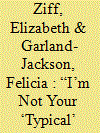

|
|
|
|
|
| Summary/Abstract |
Within the institution and military community, civilian wives of service members occupy complicated roles. On the one hand, wives are undisputedly crucial to the functioning of their service member husbands. However, wives are simultaneously considered subordinate to their husbands within the military and extended community. Indicative of this attitude are the divisive stereotypes of military wives that range from lazy and irresponsible, to overly rank-conscious and entitled. Based on combined in-depth interviews from two samples of military wives, this article investigates how the women navigate the military spouse role within the institutional, community-oriented context of the military. Specifically, we ask, how do these women construct gender and exercise agency when drawing on the stereotypes of wives within the community? By utilizing such mechanisms as symbolic boundary work, gender policing, and stereotyping, women both reify stereotypes of the military spouse and exert agency in creating the military spouse identity for themselves.
|
|
|
|
|
|
|
|
|
|
|
|
|
|
|
|
| 2 |
ID:
161894
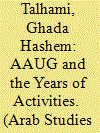

|
|
|
|
|
| Summary/Abstract |
These memoirs of the AAUG by one of its leaders, and a former president, focus on its shortcomings, as well as the role of women within the organization. It also addresses the issues of secular Arab nationalism and the more recent phenomena of Islamophobia.
|
|
|
|
|
|
|
|
|
|
|
|
|
|
|
|
| 3 |
ID:
173591
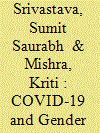

|
|
|
|
|
| Summary/Abstract |
In the times of the global Coronavirus disease (hereafter referred to as COVID-19) pandemic, the objective of the paper is to outline issues, challenges and responses with reference to gender at the global, regional and national levels. The paper locates both challenges and responses of the COVID-19 within the feminist understanding of the society and social order.
|
|
|
|
|
|
|
|
|
|
|
|
|
|
|
|
| 4 |
ID:
177003
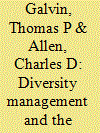

|
|
|
|
|
| Summary/Abstract |
The U.S. Military institutionalized diversity management to ensure equality of treatment and opportunity for members while eliminating discrimination in all its forms. But progress toward diversity goals has been inconsistent. For example, the U.S. Military’s implementation of the repeal of the Don’t Ask, Don’t Tell law was less successful in integrating transgender soldiers. Meanwhile, recent sexual harassment scandals show that progress is similarly fleeting in gender relations. In this article, we argue that while the aims of diversity management are important, they need an accompanying vision of what the future looks like after achieving those aims. The postdiversity vision includes more than the elimination of discriminatory behaviors; it describes what the defense establishment looks like and how it functions when diversity management is no longer required. Expressing this vision allows for more reliable and durable measures of performance and effectiveness of inclusion efforts.
|
|
|
|
|
|
|
|
|
|
|
|
|
|
|
|
| 5 |
ID:
178349


|
|
|
|
|
| Summary/Abstract |
Despite repeal of the Don’t Ask, Don’t Tell policy in 2011 and the ban on open transgender service from 2016 to 2019, lesbian, gay, bisexual, and transgender (LGBT) service members may be reluctant to disclose their identities to fellow military personnel. This study used data collected through the Department of Defense–funded mixed methods research study conducted from 2016 to 2018. A sample of 248 active duty LGBT service members completed a survey, while a sample of 42 LGBT active duty service members participated in an in-depth interview. Regression analyses tested for differences in outness by demographic and military traits; a thematic analysis of qualitative data contextualizes these findings. Outness to fellow service members varied greatly by rank, military branch, education level, sexual orientation, gender identity, and marital status. The lowest outness was to chaplains (38%), while the highest outness was to LGBT unit friends (93%). Implications for military leadership and service providers are discussed.
|
|
|
|
|
|
|
|
|
|
|
|
|
|
|
|
| 6 |
ID:
190784
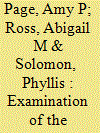

|
|
|
|
|
| Summary/Abstract |
Previous research indicates that one’s identity relates to one’s use of specific coping strategies. Exploring the relationship between self and coping in military wives is crucial to understanding how they manage military lifestyle-related stressors. The researchers hypothesized that identity status, self-concept clarity, self-monitoring, mastery, and role conflict will be related to choice of emotion-focused coping or problem-focused coping strategies. Two hundred two participants completed an anonymous online survey containing standardized scales. Ordinary least squares (OLS) regression analyses revealed that emotion-focused coping had positive relationships with achieved identity status and role conflict. Problem-focused coping had positive relationships with moratorium status, self-concept clarity, self-monitoring, and mastery. Findings provide preliminary support that sense of self is important in understanding how military wives choose to cope with particular challenges.
|
|
|
|
|
|
|
|
|
|
|
|
|
|
|
|
| 7 |
ID:
183834


|
|
|
|
|
| Summary/Abstract |
This study examined gender differences in the experiences of 923 officer cadets attending Canadian Military Colleges and 135 officer cadets attending civilian universities who completed a survey. Overall, the findings revealed that the experience of officer cadets in civilian universities was more positive, gender neutral, and their institutions’ values and culture were a better fit for them compared to their peers in Canadian Military Colleges. For officer cadets in Canadian Military Colleges, the results revealed that women were less likely to perceive gender equality in the way they were treated, the fairness of complaint mechanisms, and being treated with respect compared to men. Men in Canadian Military Collegess were less likely to perceive gender equality in performance standards than women. There were no gender differences in experiences for officer cadets in civilian universities.
|
|
|
|
|
|
|
|
|
|
|
|
|
|
|
|
| 8 |
ID:
189919
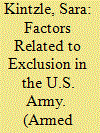

|
|
|
|
|
| Summary/Abstract |
The promotion of inclusion in the U.S. Army requires an understanding of how and why exclusion occurs. As exclusion can have deleterious impacts at both and individual and organizational level, reducing exclusive behaviors can have positive effects on Soldiers and the Army. To explore exclusion in the Army, 19 focus groups were conducted with 120 active-duty enlisted Soldiers. Two rounds of thematic analysis revealed four themes related to exclusion. Participants indicated exclusion to be often based on low or bad performance, personality factors that were identified as different or toxic, cliques within the Army unwilling to welcome others, and gender, with both men and women identifying exclusionary behaviors toward women within and outside of the work environment. Research findings offer insight into how and why exclusion occurs and how such behaviors can be addressed in the U.S. Army including training and addressing cultural and systemic barriers to inclusion.
|
|
|
|
|
|
|
|
|
|
|
|
|
|
|
|
| 9 |
ID:
188795
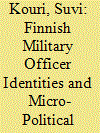

|
|
|
|
|
| Summary/Abstract |
Drawing on the concept of micro-political resistance, this article presents an empirical analysis of how officers of the Finnish Defence Forces challenge, resist, and reinforce the collective military identities constructed within the prevailing organizational discourses. There is a need for identity work to meet the norms and ideals of the military, but individuals can also work as change agents. Micro-political resistance derives from feelings of otherness as well as conflict between the dominant organizational identities and individuals’ personal interests. This study presents a thematic discourse analysis based on texts written by 108 officers and 12 interviews on the theme of “the ideal soldier.” Three main discourses of micro-political resistance were identified: perceiving the profession of a military officer as a job like any other rather than a sacred calling, putting family first, and being oneself instead of embodying the traditional masculine ideal soldier.
|
|
|
|
|
|
|
|
|
|
|
|
|
|
|
|
| 10 |
ID:
152320
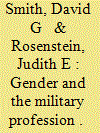

|
|
|
|
|
| Summary/Abstract |
As increasing numbers of women are recruited into the U.S. Navy, retention of women (especially in combat occupational specialties) lags behind men. Data indicate that women and men leave the Navy because of impact on their family. Lack of career persistence for women in nontraditional professions such as science, technology, engineering, and math professions has also been attributed to social psychological factors including self-efficacy, stereotype threat, and bias. We build on this research to examine the military and service academies’ socialization of women into a traditionally male profession through role model influence. Surveys were collected from students at the U.S. Naval Academy (USNA) on their work–family expectations. Results show a gendered difference in career intentions and influences by male and female non-USNA peers, but not from their families or officers. Expected work–family conflict, gender ideology, and family formation intentions were employed to explore relationships between work and family expectations.
|
|
|
|
|
|
|
|
|
|
|
|
|
|
|
|
| 11 |
ID:
108650


|
|
|
|
|
| Publication |
2011.
|
| Summary/Abstract |
The role of genders in contemporary societies is evolving under pressure from cultural, economic, religious and socio-political factors. However, gender categories are more fluid than the women/men dichotomy. They exist on a continuum between the two "ideal types" of females and males. Most people exhibit a combination of binary opposing female and male traits. Ivana Milojevic lays out three possible scenarii for the future-continued male-female polarity, unisex androgyny and multiple gender diversity. She points out that so far the drive for equality between the sexes has manifested in women assuming roles traditionally held by males, whereas few men carry out "feminine" tasks, which are part of the mostly non-monetised "love-economy".
|
|
|
|
|
|
|
|
|
|
|
|
|
|
|
|
| 12 |
ID:
177002
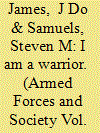

|
|
|
|
|
| Summary/Abstract |
This qualitative study examines how cadets at the U.S. Air Force Academy make sense of their experiences, form attitudes and beliefs, construct identities, and how a vocal minority of men create and perpetuate a biased gender norm. Despite an institutional intention of egalitarianism, cadets construct a highly masculinized culture. Focus group and interview analyses show how cadets perpetuate the military masculine-warrior narrative in sensemaking and the construction of gender differences. We argue that the narratives become an acceptable way to express gender biases, overriding the actual reason for the existence of fitness testing. We conclude by addressing the contradiction between policies promoting the inclusion of women in the military and the sexism described above. Acknowledging the lived experience of military personnel would allow for better perceptions of gender equality and suggests potential directions for policy, practice, and future research.
|
|
|
|
|
|
|
|
|
|
|
|
|
|
|
|
| 13 |
ID:
160976
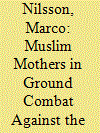

|
|
|
|
|
| Summary/Abstract |
This study analyzes the experiences and identities of Kurdish women fighting the Islamic State (IS) in northern Iraq as part of the Peshmerga Army. The case is especially interesting because these women have engaged in ground combat and because there is an empirical gap in knowledge, especially concerning Muslim women’s experiences as soldiers. Wars bring great destruction but can also catalyze social change. While seeking balance between their identities as good mothers and professional soldiers, many Kurdish women see their war participation as a chance to increase their agency and improve equality in society, as combat operations create a window of opportunity to change perceptions of women’s roles. Women soldiers still face prejudices and feel that they must prove their worth as fearless warriors in ground combat. However, interviewed soldiers said that they were not striving for equality but equivalency, stressing those qualities that women in particular can contribute in battle.
|
|
|
|
|
|
|
|
|
|
|
|
|
|
|
|
| 14 |
ID:
193066
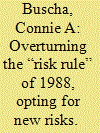

|
|
|
|
|
| Summary/Abstract |
The evolution of the status of American women as warriors between Operation Desert Shield/Desert Storm in 1990-1991 and the War in Afghanistan, beginning in 2001 [and simultaneously the Iraq War in 2003] is explored. This era of American civil-military history included rescinding the ‘Risk Rule’ of 1988, the formal ban on women serving in ground combat units. This generation of women’s legitimate military service as warriors began. The Afghanistan War period also exposed, however, the physical and emotional risks military women often face from their own colleagues on a global scale in the form of sexual violence. As a society, we purposefully must eliminate such risks inherent in the contemporary All-Volunteer Force (AVF) and clean up the resulting messes before we even consider taking the risk of conscription and mass mobilization of American women in our next war.
|
|
|
|
|
|
|
|
|
|
|
|
|
|
|
|
| 15 |
ID:
178244
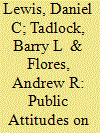

|
|
|
|
|
| Summary/Abstract |
Policy regarding the inclusion of transgender soldiers in the U.S. Military has shifted back and forth in recent years, with public opinion likely a significant factor shaping the eventual policy outcome. As such, this study examines the factors that shape public attitudes toward military service by transgender people. In particular, we examine the influence of sex, social gender roles, and attitudes toward gender in shaping transgender military service attitudes. Further, we hypothesize that personal experiences with the military and with transgender people, along with values, personality predispositions, and religion, are likely to influence individual attitudes. We test these hypotheses using data from a unique October 2015 national survey of American adults. The results suggest that personal experiences, attitudes toward gender roles, and religion have substantial but sometimes conditional effects on attitudes toward military service by transgender people.
|
|
|
|
|
|
|
|
|
|
|
|
|
|
|
|
| 16 |
ID:
174837


|
|
|
|
|
| Summary/Abstract |
Despite efforts to improve women’s military representation, mid-career female officers attrit at twice the rate of male peers. Research and theory suggest women’s turnover is influenced by family life including marriage and parenthood. But previous research has grouped women together, failing to extrapolate which factors influence retention of women with different family types. Thus, this study explored a single career point (mid-career) at different family intersections (married, unmarried, with, and without children) to elucidate work and family factors associated with female officers’ retention decisions. Using 2011 Air Force survey data (n = 1,309), regression models tested four hypotheses regarding work and family factors associated with different subgroups’ military life satisfaction and career intentions. Findings indicate that after accounting for satisfaction, work factors were insignificant for all subgroups, but family factors (as hypothesized) were significantly associated with married women’s career intentions. Results suggest that policies targeting family support/satisfaction may improve retention.
|
|
|
|
|
|
|
|
|
|
|
|
|
|
|
|
| 17 |
ID:
160625
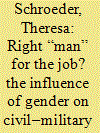

|
|
|
|
|
| Summary/Abstract |
The purpose of this study is to investigate the impact of women in politics on the risk of a coup d’état. Previous research indicates that the relationship between female political leaders and security is dependent on the office she holds. Subsequently, we expect female legislators to have a different influence than a female chief executive on the likelihood of a coup. We argue that a higher level of female representation reduces the risk of a coup d’état. However, we assert that a female chief executive has a different effect and increases coup risk. Using data covering 160 states over the years 1952 to 2009, our empirical tests provide support for our expectations. All else being equal, increased levels of women in parliament lead to a substantial drop in coup likelihood. However, the argument that a female chief executive will be more coup prone is not fully supported in our findings.
|
|
|
|
|
|
|
|
|
|
|
|
|
|
|
|
| 18 |
ID:
186345
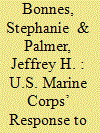

|
|
|
|
|
| Summary/Abstract |
In this article, we show how the U.S. military treats domestic violence and sexual assault as distinct forms of abuse, which has particular consequences for victims of intimate partner sexual violence. We explore how a specific U.S. military branch, the Marine Corps, complicates these issues further by providing services to intimate partner sexual violence victims from two different programs. Analyzing military orders and documents related to Family Advocacy Program and Sexual Assault Prevention and Response program, interviews with eight military prosecutors, and the experiences of one military lawyer, we examine program and interactional-level factors that shape victim services, advocacy, and processes. We find that there are program differences in specialized services, coordinated services, and potential breaches of confidentiality related to victim’s cases. We recommend that the Marine Corps recognize the intersections of sexual violence and domestic violence and offer more tailored services to victims of intimate partner sexual violence.
|
|
|
|
|
|
|
|
|
|
|
|
|
|
|
|
|
|
|
|
|